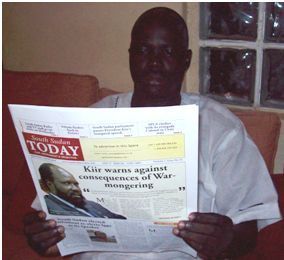Stalled media laws raise concerns of journalist community in Juba
September 9, 2010 (JUBA) — Local journalists are concerned that a lack of clarity from the Southern Sudanese government about laws that govern the media here will hamper their ability to report as the critical self-determination vote approaches.

The minister, however, rejected complaints from local journalists regarding the stalled status of the media legislation, which remains the subject of heated dispute between the media community and the southern government.
Minister Luk admitted that there was a “backlog” of laws pending in the southern parliament but said that journalists were partially to blame for the delay on the media bill in particular because “some of you were not happy…with some of the provisions and the bill was withdrawn from parliament.”
Luk said that with “controversial” legislation such as the media bill, discussions between the government and “stakeholders” such as the media community were necessary. When pressed on why these discussions had not taken place, Luk argued that the journalists were the ones disputing the draft and delaying the passage of the legislation.
Local media organizations supported by international partners such as Norwegian People’s Aid began collaborating with the Ministry of Legal Affairs in 2006 on draft media legislation. After the ministry revised the joint draft bill and presented it to the southern parliament last year, media groups complained that the bill had been drastically altered and no longer included their input on key provisions. After journalists submitted a petition in late 2009 to southern president Salva Kiir, the bill presented to parliament was withdrawn and returned to the ministry for revision.
“As journalists, we don’t make laws,” said David De Dau, director of the Agency for Independent Media in Juba. “We can only contribute and see to it that our rights have been guarded,” he said, claiming that the former minister of legal affairs had attempted to restrict the media’s ability to report and delay the passage of the media law.
In March, after police officers forced entrance into two Juba-based radio stations and detained staff on the grounds that one of the stations had broadcast an interview for an opposition candidate for the April elections, the media community here called once again for the government to pass “well defined” media legislation.
Jacob Akol, editor of the Gurtong Trust online news site, said in a press release following the March incident that the media were being forced to “play a game of football without clear rules,” because their conduct and rights as journalists were not defined in the south’s interim constitution or in any legislation specifically governing the media.
With just four months remaining before the southern referendum on independence, journalists remain concerned that their ability to report on this key political event may be restricted in the continued absence of media legislation.
John Tanza Mabusu, a longtime journalist with the Sudan Radio Service, said that “the media is operating in a situation whereby if you say anything and somebody feels offended, they can say this is against the law but you don’t know which law they are referring to.”
“This has affected the operation of the media in this region to effectively engage the government in tackling some of the issues that are at the heart of our listeners or readers,” said Mabusu.
Nhial Bol, editor-in-chief of The Citizen, a popular English language daily in Southern Sudan, has been working for more than a year to build the first printing press in the south—The Citizen is printed in Khartoum—but has faced funding problems given the high costs of importing expensive materials to the southern capital.
Bol worries that if the media law is passed in its current form, the government will gain control of the editorial content of his paper. He says that the draft put forth by the government contains a provision that would grant the government the right to appoint the members of the “media council” which would be charged with approving the appointment of editors of all of the registered media houses.
This arrangement would mirror the system in northern Sudan, where the Khartoum government—through the ministry of information and communications—controls the National Press Council, which licenses and registers journalists and newspapers.
“The combination of government control, daily censorship of independent media, and abuse and harassment of journalists by the[national intelligence services], is a severe barrier to freedom of expression and access to information in Sudan,” said Human Rights Watch in a 2009 report on the media climate in Sudan, referring primarily to the situation in northern Sudan.
In the south, the southern government does not have the same record of media censorship, though journalists have accused the government here of attempting to adopt policies similar to those of Khartoum.
At the press conference where the minister of legal affairs spoke, Bol told the minister that the current draft media law is reminiscent of the 1996 media law passed by the Khartoum government, a law he said was masterminded by Salah Gosh, director of Khartoum’s National Security and Intelligence Services.
The minister responded that the southern government’s draft legislation was not based on the northern government’s laws (which were revised ahead of this year’s nationwide elections), and that the south’s law had “identical provisions” to other countries in Africa such as Kenya and Uganda.
(ST)

Gatwech
Stalled media laws raise concerns of journalist community in Juba
Minister John Luk Jok,
Make sure that the law you are drafting gives the media all the necessary freedoms it deserves.
Media is the eye and ear of the public as well as the messenger of the government.
Freedom of media is very, very important in a democratic nation.